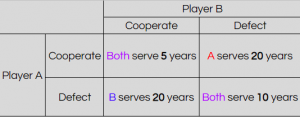εpsilon talk
Musings on math and education. Made with love by the Washington Student Math Association.
Game Theory
Game theory is considered by many to be a complex yet simple theory that deals with rules, probability, and math. Essentially, it is the study of thinking in different situations where the motives of the other decision makers affect the thinking processes of others. Some may ask, how is math involved in game theory? Or how is math involved with winning or losing? These questions lead to many answers, all tying back to logic thinking, mathematical models, and above all, strategy. Players in these games or simulations make decisions based on the other’s players motivation and tactics – it requires anticipation of events beforehand and data analysis. This aspect of the subject differentiates it with general mathematics.
Though the idea of game theory has been around for quite a while, It was first defined and described first in a book called The Theory of Games and Economic Behavior in 1944. Created by mathematician, John von Neumann and economist, Oskar Morgenstern.
Essentially, game theory studies how people will respond to rules, or “play the game” in situations where the motives of other players are involved.
A popular example of game theory analysis would be a hypothetical situation called the Prisoner’s Dilemma. One version of the prisoner’s dilemma is where 2 individuals – we can call them person A and person B – are faced with a decision separately. They can either stay silent(cooperate) or betray the other person(defect) for a total of 4 outcomes. If they both stay silent they both serve 5 years. If they both defect, however, they serve 10 years. In addition if one person defects while the other stays silent, the person who defects goes free while the other serves 20 years.
Thus both players are faced with choosing between self-interest and mutual-interest, where not one situation would be ideal to both the individual or the group. People who work in jobs involving Game theory, work with similar situations related to their profession.
Mathematicians in particular analyze the conditions of different situations and develop algorithms to predict outcomes. Economists also use game theory to model the flow of money in a market. Game theory also has applications in the world of Artificial Intelligence, used by researchers and scientists to understand deep learning in machines. Which has been used to model real life situations. And the increasing success of AI is attributed to its increasing involvement with game theory. Besides economics and AI, it also has involvement in various other subjects including chemistry, bioinformatics, engineering, and many more areas.
Game theory may seem a small area of mathematics but it has widespread effects on topics far different from games and often impacts research on complex analysis of machines and humans – it has changed economics, math and much of the world today.

Leave a Reply